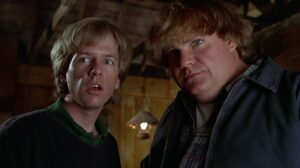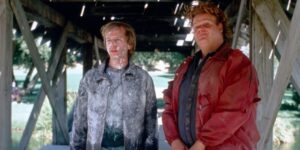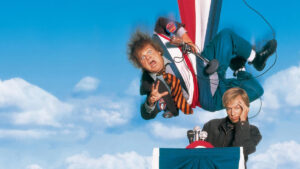Publication Date: 06-06-2025
Black Sheep (1996) review
Dir. Penelope Spheeris
By: Steve Pulaski
Rating: ★★★
Black Sheep was commissioned, written, filmed, and released less than a year after Tommy Boy hit theaters in March 1995. It was a slapdash production brewed out of desperation when Paramount realized that perhaps they shortchanged the marketing of Tommy Boy, and left money on the table given the positive word-of-mouth from audiences (the film “only” made $32 million on a $20 million budget). Under the pressure of litigation if he failed to complete a script by a strict deadline, Fred Wolf, an uncredited writer on that now-inimitable 90s comedy, penned the screenplay for Black Sheep in merely a few days. Spheeris recalled the production as hurried, chaotic, and tumultuous, with numerous on-set fights, the firing/rehiring of Wolf multiple times over, an extremely dissatisfied David Spade, an apathetic Chris Farley, who didn’t like the script in the first place, and a breakneck shooting schedule all contributing to the pervasive discontentment.
Black Sheep was humbly released to theaters in February 1996, and most of the (negative) reviews billed it as an inferior clone to Tommy Boy, minus the charm. As a teenager, I thoroughly liked both movies, and even once believed myself as I said that Black Sheep was the superior of the two. I no longer believe that to be the case (sidebar: I still like Casino a tick more than Goodfellas). That said, when viewed as an exercise in hurricanic slapstick overload ala Bio-Dome and Ed, Edd n Eddy, its pursuit of a laugh by any-means-necessary, coupled with the oil-and-water chemistry of Farley/Spade, it does prompt enough belly-laughs while exhibiting all the degrees of a comfort movie.

The bafflingly silly plot involves Farley’s Mike Donnelly trying to get his older brother, Al (Tim Matheson), elected in the midst of a deadlocked gubernatorial race against the morose, pickle-faced incumbent (Christine Ebersole). Mike is the type to butcher a cup of coffee, or screw up a one-car funeral. The governor and her aides adore Mike, however, because his propensity to find trouble or insert himself into precarious situations allows for delicious front-page fodder for the tabloids. “He’s like Roger Clinton, Billy Carter, and all the Reagan kids rolled into one,” an aide giddily declares after snapping a picture of Mike holding a beer bottle and a joint — while he was in the middle of lecturing teens about the dangers of substances.
Al, who, to his credit, unlike the conventional movie character of this ilk, tries mightily to give Mike the benefit of the doubt, but it’s clear he needs a keeper. Enter Steve Dodds (Spade), one of Al’s personal do-boys, to watch Mike at all times. It’s the same situational setup as Tommy Boy, right down to the blue-and-red color scheme of the film’s theatrical one sheet.
After the recreational center where Mike works mysteriously burns, and arson is expected since the bloke just lost his job there, Steve takes Mike to a shack in Washington’s rural country, where the two will pedal Al’s platform to the thick forest and the sparse number of denizens who live there. This setting leads to the funniest stretch of Black Sheep. Steve is harassed by the locals, including a nutso Gary Busey and a gang of dirtballs who spray him with a fire extinguisher; Mike trips over his shoelaces all while traversing the wilderness; and a boulder ends up colliding with the shack, sending the structure careening down the cliff.

Once Spheeris and Wolf have the two head back to civilization, where Mike crashes an MTV “Rock the Vote” campaign concert, all while Busey (going full Randy Quaid even before Quaid himself did) stalks the duo, Black Sheep loses some of its comic abilities. Or maybe, its manic energy and dependency on cartoonish stunts starts to wear on the viewer, even one who enjoys watching Farley and Spade’s friction reach critical mass. That said, the “slobs vs. snobs” ethos of the film circumvents in a third act that is as implausible as it is entertaining.
Black Sheep is one of those movies where you have to accept that every scene essentially takes place in a metaphorical “joke-shop.” Settings and sets themselves are rendered in such unfathomable ways, where it wouldn’t be untoward nor unexpected if someone outright slipped on a banana peel. Consider the scene when the governor chops down a tree for a photo-op before one county’s many loggers and lumberjacks, as a way of gratuitous pandering. The tree is ready to come down, so much so that she’s told one whack will prompt the “Timber!” moment the cameras are craving. She hits it once, with an axe, and nothing. A couple more hits and some awkward smiles and the tree crashes down on a snack-table that was thoughtlessly (or thoughtfully, if you were a part of the film’s set design) placed adjacent to the large tree. Stupid is as stupid does, and at times stupid succeeds, as is the case here.
Starring: Chris Farley, David Spade, Tim Matheson, Christine Ebersole, Gary Busey, and Grant Heslov. Directed by: Penelope Spheeris.
About Steve Pulaski
Steve Pulaski has been reviewing movies since 2009 for a barrage of different outlets. He graduated North Central College in 2018 and currently works as an on-air radio personality. He also hosts a weekly movie podcast called "Sleepless with Steve," dedicated to film and the film industry, on his YouTube channel. In addition to writing, he's a die-hard Chicago Bears fan and has two cats, appropriately named Siskel and Ebert!


